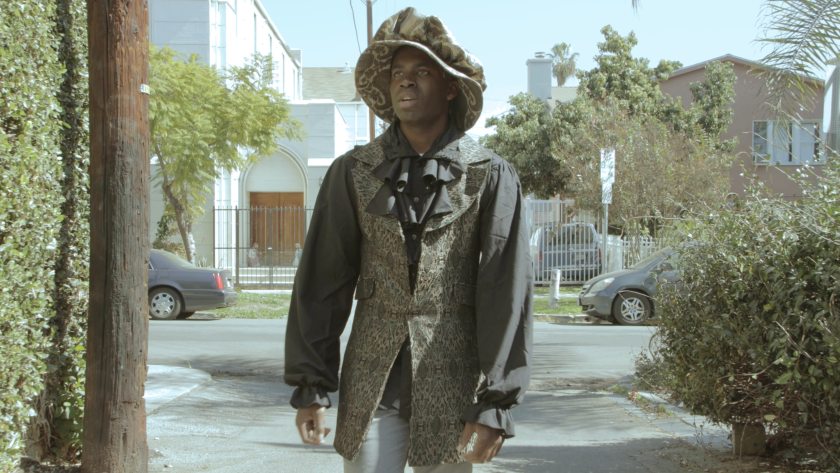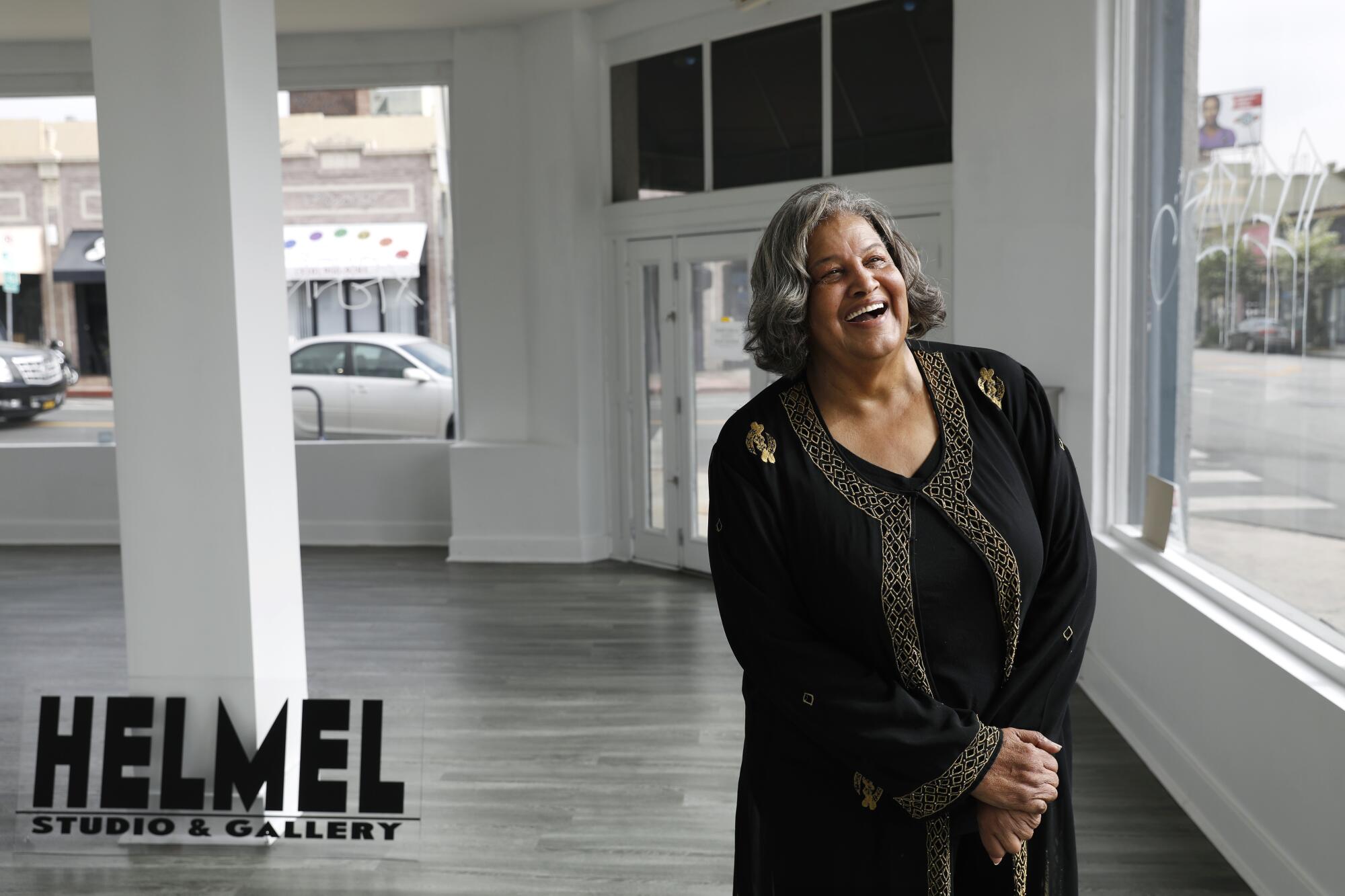
- Share via
Melanie Andrews was 10 years old and bedridden with sepsis when she was introduced to the world of Shakespeare. Her teachers were her mother and grandmother, a college professor who encouraged Andrews to read from the 1950s encyclopedia series “Great Books of the Western World,” which encompasses more than 400 works of literature.
Over the span of a year, Andrews estimates, she read 20 Shakespeare plays, beginning with “A Midsummer Night’s Dream,” while confined to her Compton home.
She says she is one of the few people who has read and directed, designed or performed every Shakespeare play, “including ‘Coriolanus’ and ‘Timon of Athens,’ which nobody reads, because of my Nana. She was there every day for almost a year because I couldn’t walk.”
Now in her 70s, Andrews has shared her lifelong devotion to the Bard with thousands of students — most of them Black or Latino — over a 30-year career teaching theater in South L.A. schools including Washington Preparatory High School and Compton High School. She’s the artistic director of the Inner City Shakespeare Ensemble, a community theater company that pairs young performers in their teens and 20s with professional mentors.
- Share via
Founded in 2010 by Andrews along with late film producer Paul Heller and TV and film producer Katy Haber, the group began as a collaboration between the British Academy of Film and Television Arts and Washington Prep, which The Times once called one of L.A.’s “most troubled” schools. The ensemble recruits emerging actors to perform Shakespeare in parks and other venues through school and community organizations, churches and casting websites.
The best recruitment tactic, however, is former students who remain fans of Andrews and her work.
For Andrews, Shakespeare represents a foundation for success, particularly for students of color attending under-resourced schools. If they can master Shakespearean wordplay, “they can master anything,” she says.
But it’s not all Shakespeare. The theater ensemble has evolved into a support system and expanding network for the estimated 1,000 young people who have been involved since its founding.
If the young actors have a need, Andrews is there to fill it. Andrews says she buys socks and underwear. She’s helped students to move into their college dorms, to purchase books for class, and to make sure their financial aid packages are settled. Over 10 years of the program, she’s been to weddings and there’s also been a baby, “but no babies that we shouldn’t have,” she quickly adds.
Andrews is determined to help young artists land internships in an industry that is notoriously hard to crack for people of color.
“The arts is an underground way to build people, to allow them to tell their stories,” she says. “We try to give them opportunities, but we also give them somebody. Some of them that need it, there’s somebody who loves you, somebody you can talk to.”
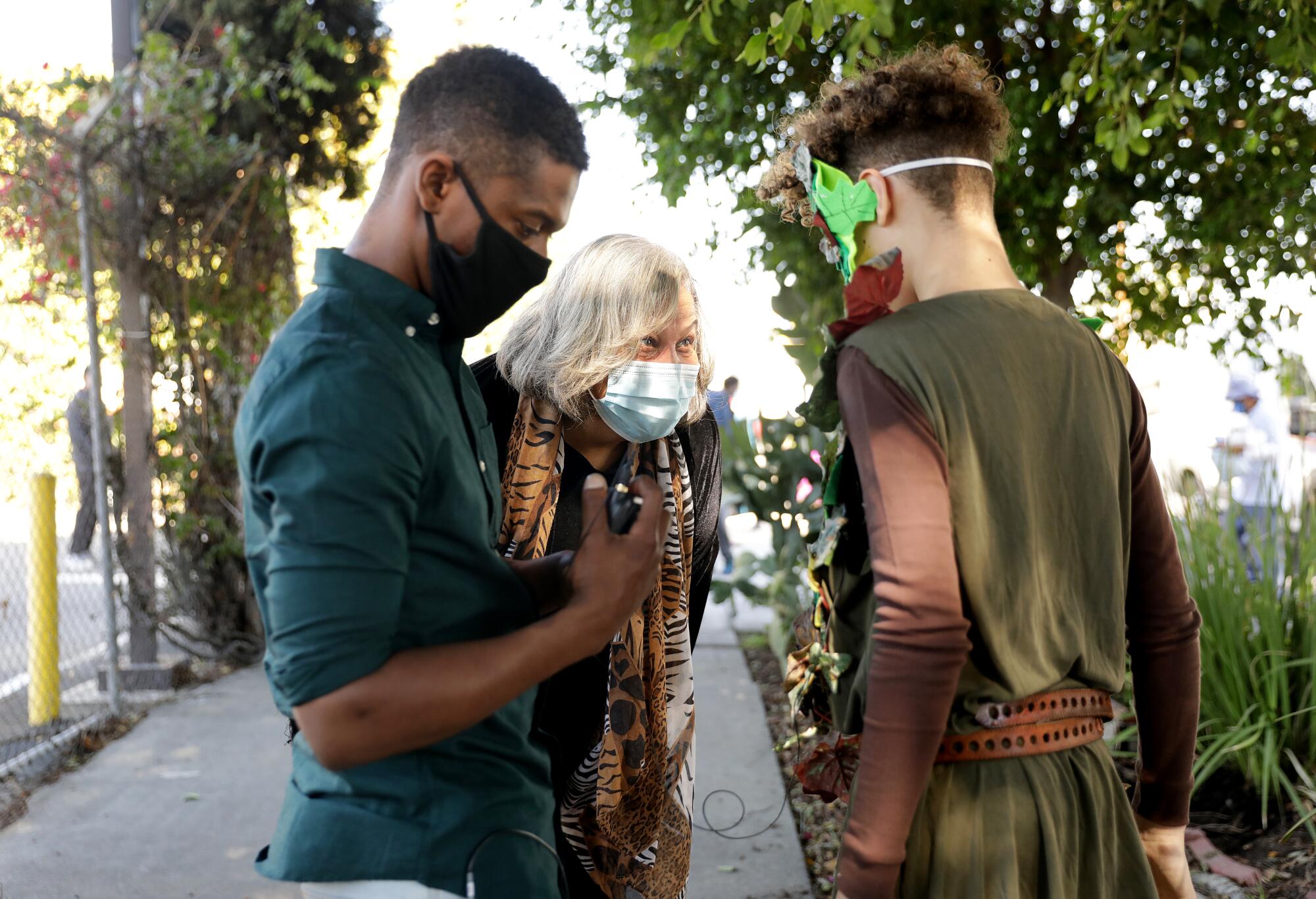
And by the way, Andrews refers to every student as her “kid” — from the youngest member in the company, a 12-year-old working to perfect his Puck monologue from “A Midsummer Night’s Dream,” to the mid-40s mom who took her theater class in the 1990s.
Andrews says most of her immediate biological family is dead. “This is my tribe,” she said. “These are my children and I keep up with them. I support them. I kick their ass. I celebrate.”
In February, Andrews trekked around East Hollywood with company actors near HelMel Studios & Gallery, the artist space created by actor Val Kilmer and Inner City Shakespeare’s new home. Until last year, the troupe was a pop-up company that rehearsed in parks, churches and sometimes Andrews’ apartment lobby, but inspired by the group, Kilmer offered up his space. “Everyone who comes into contact with Melanie and her kids comes away with a renewed sense of purpose in life and in art,” Kilmer says by email.
They were filming “Shakespeare in the Streets,” a new project where actors perform short monologues across the city.
Tiptoeing backward near company cinematographer Joshua Thomas, who performed in the ensemble’s first “Romeo and Juliet” production, Andrews calls out directions to actor Benjamin White, a 22-year-old who performed a monologue from “The Two Gentlemen of Verona.” “Diction! diction! And a little bit louder, sweetie.”
The company plans to release the project over the summer as a national campaign, encouraging other young actors to post their own short takes on Shakespeare monologues to social media.
This is one example of how the company has pivoted in the past year.
Inner City Shakespeare was gearing up for “Romeo and Juliet” when the pandemic forced the ensemble to take the work to Zoom. “We rehearsed online and it was boring at first, so we added virtual backgrounds, which are horrible,” Andrews says. The production, which premiered last summer, “was a little stilted, but we were happy with it — we got through it.”
But some company members felt “Shakespeare’d out,” Andrews says, and after the murder of George Floyd and ensuing protests, the young performers wanted to make work in solidarity with the Black Lives Matter movement.

“One of our kids was killed years ago in front of Washington Prep,” Andrews says. “It was just heartbreaking, and there’s so many more that I’ve seen and been around that don’t even make the news.”
So Andrews invited a group of professional actors and ensemble members to tackle excerpts from a collection of more than 2,300 first-person accounts of slavery, “Born in Slavery: Slave Narratives From the Federal Writers’ Project, 1936-1938.”
Many tearful Zoom rehearsals turned into “They Call Us the N-Word,” a nearly hourlong film combining monologues from the “Slave Narratives” with archival footage, which the group submitted to film festivals. Andrews hopes people watching the film will make connections between slavery and the systemic inequalities affecting Black people today.
Andrews’ own great-grandmother was enslaved in Texas. Her paternal grandfather, an Army veteran who was lynched in Louisiana, is the inspiration behind a documentary she’s working on with assistance from a company member.
When Andrews was 9, her maternal grandfather gifted her with an NAACP membership, kicking off a lifetime of political activism. “I wanted a Barbie,” she says, laughing. “But he gave me the greatest gift ever.” At 15, she attended the Southern Christian Leadership Conference, the civil rights organization co-founded by Martin Luther King Jr. Nearly 40 years later, she ran for and won a seat on the Compton City Council.
Over time, Andrews watched Compton change, and witnessed the devastation of drugs, poverty, crime and unemployment on the community. Her father, a football coach who tried to stop gangs from recruiting his athletes, was working at a gas station in 1967 when he was shot and killed as part of a gang initiation.
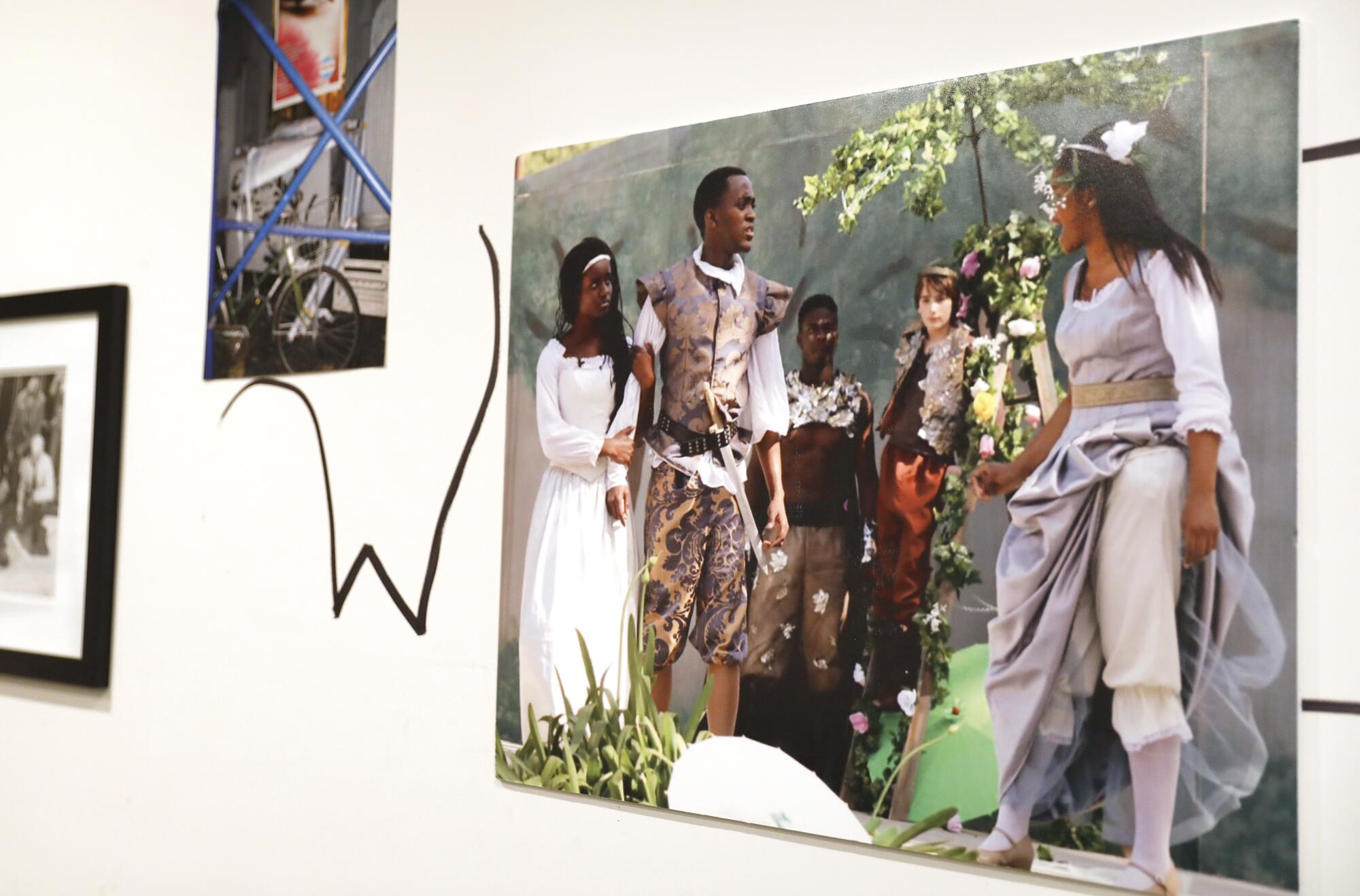
Andrews cried when she met an 8-year-old attending her first community demonstration last year in Culver City. “Because here she is in 2020 having to demonstrate for the same stuff we demonstrated for in 1952, 1963, 1970.”
In her decades of teaching theater in South L.A., Andrews has had “the talk” with her students, the one many Black parents have with their children: Never run a stop sign, make sure your taillights are working properly and vehicle registration is up to date — all to minimize the chance of interaction with the police. “On more than one occasion, I have gone down to the police who are stopping and rousting the kids around Washington Prep because the kids are leaving after 7 o’clock,” she says.
“My heart bleeds over little Breonna; she was killed in her bed, and Tamir Rice and all these people,” Andrews says. “These are the kids I teach. I can see her face in my girls, and Tamir’s face in the little 14-year-olds that I jerk by their shirt and say, ‘What the hell are you doing?’”
Andrews’ tough love approach is born out of her own experiences and the need to prepare her students for the tough realities of finding success in entertainment. She learned her motto, “No is a vitamin,” from industry executive Suzanne de Passe while singing back-up for Motown.
After graduating from Compton’s Centennial High School at 16, Andrews acted in theater companies across the country. But being cast only in maid roles after joining the Santa Rosa Theatre Company, connected to the still-running Summer Rep Theatre Festival, quickly ended her desire to act.
Instead, she cultivated her love of behind-the-scenes work, costume and set design, lighting and directing.
After receiving a master’s degree in education from USC, she began teaching in 1975, officially retiring about four years ago.
Uyoata Udi, who has appeared in HBO’s “Watchmen” and NBC’s “This Is Us,” began working with Andrews as a teenager. “She saw the talent that was in me,” he says, “and that’s why I always thank her so much because she would not give me a break.”
He recalls performing a monologue for a group of students who gave him a standing ovation. Basking in the applause, Andrews turned to Udi and asked a trick question: “What did you think?”
Udi replied, “I mean it’s obvious, I did it amazing.”
“She was like, ‘I didn’t feel not one thing.’ You can always entertain, but the real ones know whether you’re being truthful or not,” he recounts. “It’s those moments that stick with me today.”
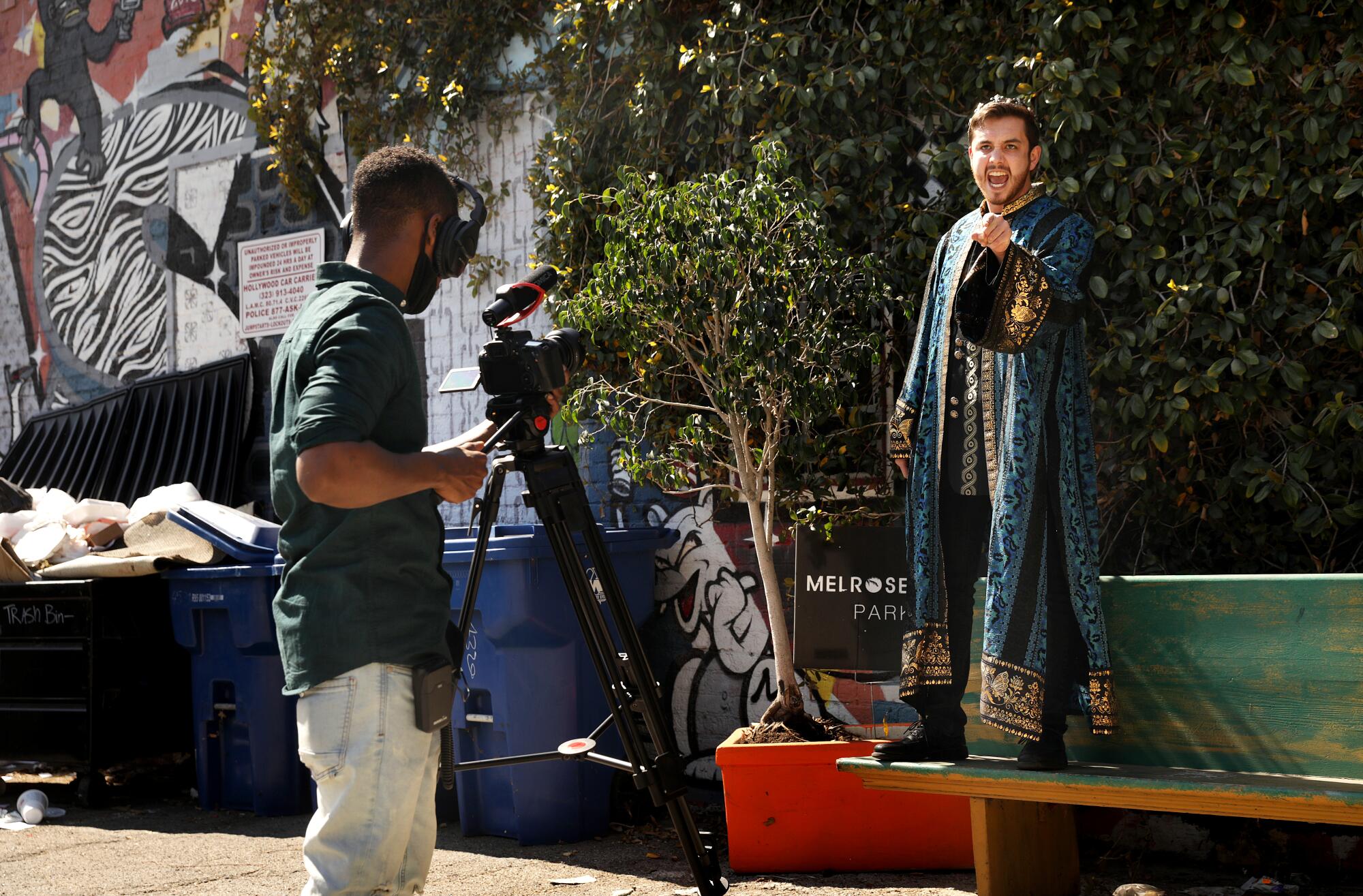
Andrews “has a profound gift with students,” says Amit Bhalla, Inner City Shakespeare president and screenwriter.
She’s “endured an immense amount of suffering in her life,” he says, and proved that through art it “can be made into something deeply meaningful for her and for everybody.”
Although Inner City Shakespeare was active during the pandemic — they’re currently working on shooting a series of 10-minute films written by company members — the group is still struggling to stay afloat, like many other arts groups.
The troupe has historically been funded through board members, and Andrews regularly draws from her savings to fund productions. (As someone who worked a part-time job while teaching in high schools to fund theater productions, she’s used to it.) Last year, the company hired its first grant writer.
In the past, the company hadn’t focused on tracking the type of data that funders requested. “It’s not the spirit that either Melanie or I worked in, which was more of, you show up and we’ll fold you in,” Bhalla says. “If you show up for a week and then leave because you don’t want to do this, or whatever, we’re still here. We’ll still be there.”
But over several months of interviews, Andrews made it clear she was proud to repeat the Inner City Shakespeare statistics: 100% graduate high school and 85% graduate from college. Her kids have gone on to work on Broadway, become teachers and lawyers, create costumes for Disney and produce films.
“That doesn’t happen in South Central,” Andrews says. “Not because the kids aren’t capable, but they don’t get the opportunity.”
More to Read
The biggest entertainment stories
Get our big stories about Hollywood, film, television, music, arts, culture and more right in your inbox as soon as they publish.
You may occasionally receive promotional content from the Los Angeles Times.
